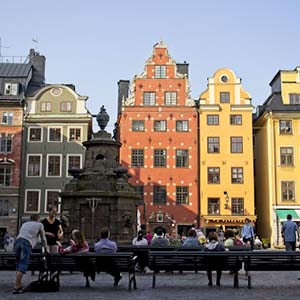Moving to Sweden
For charming towns, a sustainable way of life, and stunning lakes, Sweden is the perfect place to move to. Sweden provides an excellent quality of life to its 9.9 million citizens and boasts excellent welfare services, supporting the population from “cradle to grave”. It is a very stable country in terms of not just the economy, but also the climate and its infrastructure. The culture and history of Sweden are also rich with customs and folklore, and the surplus of facilities and amenities will allow people moving to Sweden from the UK a comfortable and affordable way of life.
Orientation
Sweden is the fifth largest country in Europe and shares the Scandinavian Peninsula with Norway and Finland. There is great variety in the landscapes of Sweden, from sparsely populated Arctic regions to green forests, and peaceful lakes and rivers. For people moving to Sweden from the UK, the time difference will not pose a huge problem, as Sweden observes Greenwich Mean Time (GMT) plus 1 hour.
As Sweden’s Viking ancestors were sea-faring people, many of Sweden’s cities are located on the coast of the country, its major cities also being major seaports. Stockholm, Sweden’s capital, is one of the world’s most beautiful capital cities. Founded in 1252, it is built on 22 islands and the city itself is home to around 1 million people. The city is well-organised and clean and is known as the industrial, educational, and cultural centre of Sweden. Stockholm is located on the Southeast coast of the country, with a concentration of other major cities to the South and along the South coast.

Learning the Language
As in most Scandinavian countries, English is spoken by many people living in Sweden. However, learning Swedish is highly recommended for people moving to Sweden. A basic understanding of Swedish will not only make administrative tasks far easier but will also ease your assimilation into local society. Making the effort to learn will also impress local people, making it easier for you to make friends and enjoy your time living in Sweden. There are many opportunities to start learning before you move to Sweden, however once enrolled in a municipality in Sweden, adults over 16 are eligible to receive free Swedish language training, sponsored by the state for Immigrants moving to Sweden.
Getting Ready to Go
There are many documents to prepare before your move to Sweden from the UK. Employers may be able to assist in providing documentation such as passports, visas, and other permits, so you should check with your company and accept any support that they provide. This could avoid delays and mistakes in applications, saving you time and money in your relocation.
For current and more detailed information on entry requirements, Sweden’s Government Website and the Swedish Migration Agency are good resources.
Customs Requirements
Taking household goods and personal items with you when moving to Sweden will not incur customs duties or VAT. However, this is only possible if the property is intended for your personal use and granted you have resided in your country of departure for at least 12 months prior to moving to Sweden. Under some circumstances, you can be granted exempt from this 12-month requirement by Swedish Customs. Shipments must also arrive in Sweden within 12 months of an individual’s immigration. When your personal shipment arrives, you should notify the customs authority at the point of entry. More information can be found from Swedish Customs.
Passports
When travelling anywhere outside of Britain, you will need to provide a valid passport. Passports should be valid for longer than the amount of time you plan to spend in Sweden to allow for any mistakes or delays in travel.
Visas
Visas are documents required by governments to authorise your presence in another country. They will allow entry to a country for a specific purpose and amount of time. It can be stamped in a passport, a separate piece of paper, or as a digital document. The type of visa, and therefore the visa process, will differ depending on the length of your stay and the purpose of your move to Sweden. You should ensure ample time for your application to be processed and accepted before travel.

Restricted Items
There are limits placed on tax-free items containing alcohol or tobacco. You should avoid placing these in your household shipment to avoid any delays in customs clearances. A separate inventory is required for shipping these items. Items less than 12 months old will incur duty tax for non-EU citizens. Prescriptions are required for any medication and people travelling from Britain are permitted to carry a three-month supply of any prescription medication.
Prohibited Items
Some items are not permitted to travel into Sweden. Any weapons or explosives are prohibited from being imported, including blades, firearms, ammunition, and fireworks. Weapons for hunting and shooting competitions will require an import licence from the Swedish Police. Drugs, plants, and products made from the skin or ivory of endangered animals are also prohibited in Sweden.
Taking my Pet to Sweden
Many Swedes have household pets. However, it’s important to note that accommodation owners often impose restrictions, including prohibiting pets. There are also strict local regulations on noise, waste disposal, and leash laws. Pet supplies and veterinary treatment are widely accessible.
There are strict regulations on importing animals to Sweden, particularly from outside the EU. Moving to Sweden from the UK with a pet will require several documents to be presented. Quarantine times will depend on the risk level of your country of origin. Import requirements are as follows:
- Veterinary Certificate E9.45 or Pet Passport: The Veterinary Certificate E9.45 must be obtained through the Swedish Board of Agriculture. It is issued by a veterinarian in your home country and must include all required treatments. All pet vaccination certificates must also accompany the certificate.
- Identity Marking: Before import to Sweden, pets must be marked by your veterinarian, either by an ISO standard microchip or a tattoo. For non-standard microchips, you must bring your own AVID microchip scanner.
- Rabies Vaccination: A rabies vaccination must have been administered to your pet by a veterinarian. A rabies test must also be performed no sooner than 120 days after the most recent vaccination and re-vaccinations in Sweden at certain intervals are necessary.
- Deworming: In the 10 days prior to your pet travelling to Sweden from the UK, a veterinarian must deworm against tapeworms.
- Customs Declaration: When moving to Sweden from the UK with pets, pets must arrive at Landvetter or Arlanda airports in Sweden. You should arrive through the ‘goods to declare’ gate at customs to report you are bringing a pet.
Quarantine Requirements: Pets imported from countries where rabies is considered endemic will need to undergo a 120-day quarantine at one of four approved quarantine facilities. This will need to be booked in advance as there is a long waiting list and note that quarantine can only be booked once your import licence has been issued.
There is no prohibition on certain breeds of dogs, with certain exceptions for certain crossbreeds of dogs and felines. It is, however, illegal to keep dogs that are prone to aggressive behaviour against other dogs or humans. Regulations are subject to change, so contact the Swedish Board of Agriculture for up-to-date information.
Finances in Sweden
When moving to Sweden from the UK, you can be assured that your finances will be in good hands. Banking in Sweden is modern and efficient, with the 4 major national banks offering comprehensive financial services. Banks promote telephone and internet banking, meaning that all services can be performed online. Sweden, like the UK, is a near cash-free country, meaning that some branches will no longer accept cash.
Opening a bank account in Sweden will require a number of documents to be supplied. This includes your passport, ID card (legitimation), residence permit (uppehållstillstånd), and proof of employment. Your Swedish personal identification number (personnummer) is also required at most banks.
Currency and Exchange
Despite Sweden being a member of the European Union, Sweden has not adopted the Euro. The official currency of Sweden is the Swedish krona (SEK). 1 krona is divided into 100 öre, and there are notes in denominations of 20, 50, 100, 200, 500, and 1000 kronor. There are also one-, two-, five-, and 10-kronor coins in circulation. Banks usually have foreign currency exchange services and offer competitive rates, operating at airports, train stations, hotels, and other tourist locations.

Accommodation in Sweden
When considering the move to Sweden, it’s important to note that there is a severe shortage of accommodation across the majority of the country, particularly in the capital. Demand is increasing faster than new houses and flats are being built, so your decision on renting or buying accommodation could be heavily influenced by availability.
Renting in Sweden
There are two types of rental contracts in Sweden; ‘first-hand contracts’ and ‘second-hand contracts’. First-hand contracts involve renting from the owner of the building, which has long waiting lists as they are high in demand. Accommodation agents, or fastighetsföretag, can sign you up for a place in this queue. The line can be shortened if you know the owner of a building or choose to live outside of cities. To sublet an entire property, approval by the landlord is required. Failure to gain approval can be met with eviction, so approach subletting with caution and do your research.
Leases can vary in length, usually between 6 months and 2 to 3 years. You will need to negotiate this to suit your requirements. Rent is usually paid every month; however, this can vary depending on the style of management. Security deposits are usually paid to the equivalent of 3 months’ rent. Water and heating are usually included.

Buying Property in Sweden
If you are moving to Sweden for a prolonged period of time, you might consider buying property over renting it. Due to favourable mortgage rates and slow construction of new buildings, the market is extremely competitive. You will be lucky to find a property that meets your exact requirements and should expect to settle for the first available property you find.
When deciding to buy, there are things you should do beforehand. First of all, decide on an area where you would like to live, then contact the neighbourhood real estate agent, as few properties will be listed without an estate agent. If you do find a property listed by the owner of a building, enlist the help of a lawyer before signing the contract. In any case, have the property evaluated and measured before agreeing a contract. Radon levels in some Swedish homes can be problematic.
Best Places To Live in Sweden
There are many attractive places to live for people moving to Sweden from the UK. By far the most popular area is Stockholm and its surrounding suburbs. Stockholm is the cultural and economic centre of the country with many green areas, not to mention a very safe and clean place. Wherever you choose to live, it’s important that it is convenient to schools and work as needed. Few houses are available, and apartments are the most readily available type of housing in Swedish cities.
Short-Term Housing
In the cities of Stockholm and Göteborg, there are several hotels that are able to provide arrangements for extended stays. In other cities, availability will vary. In most major cities, however, serviced apartments and short-term stay corporate housing can be found. Finding short-term accommodation can be difficult, and assistance is provided by the following sites:
- National Corporate Housing
- Nestpick
- Red Apple Apartments
- Företagsbostäder Business Apartments
- Residentsportalen
Our extensive network of local home search experts will ensure we have access to the latest properties coming onto the market. This means that we can find the right temporary accommodation for you, whatever your requirements and whatever your budget.
Transport in Sweden
While it may be possible to move to Sweden without a car, many expats living in Sweden choose to take their own vehicle or acquire a personal vehicle locally. This will depend on your circumstances and location in Sweden. Public transportation is often preferred for commuting, but for personal use a vehicle is useful. Furthermore, getting around by bicycle is popular in Stockholm and most other parts of the country. Bicycle lanes, shops, and storage are ample in most cities.
Taking a Vehicle to Sweden
Employers sometimes place restrictions on the size or volume of your household shipment or sometimes exclude certain large items. This can affect your choice to include your vehicle in your shipment, so it’s important to contact your employer to ascertain any restrictions before deciding to bring your car when moving to Sweden.
Moving to Sweden from the UK with your vehicle will mean importing the vehicle from a non-EEA country, or third country. If you have possessed your vehicle for longer than 6 months, the vehicle can be imported free of import duties or VAT, trusted that the vehicle is declared at Swedish Customs. Vehicles must remain in the driver’s possession for 12 months after arrival in Sweden – selling, lending, or donating the vehicle during this period will incur taxes and duties.
If your vehicle has valid registration and insurance from the UK, you may drive it for up to 1 week in Sweden. You must procure auto insurance from a Swedish Insurance Company to receive temporary registration in the form of a certificate. This certificate, along with an application to verify origin and proof of customs clearance, must be supplied to the Swedish Transport Agency.
Acquiring a vehicle locally when moving to Sweden is a popular choice for many expats as alterations are not required. Most models of vehicles can be purchased in Sweden, and the resale value of the car after 1 or 2 years is excellent. Second-hand vehicles are also readily available, particularly for departing expats.
Driver’s Licence
For people moving to Sweden with a UK driving licence, you may use your UK licence if you are a Swedish resident. However, you may find it useful to exchange your licence for a Swedish one. This may be required by your employer, or if your UK licence is no longer in date. To exchange your licence, contact your local County Administrative Board or Länsstyrelsen.
To obtain a Swedish driver’s licence, you must pass three tests. Prior to tests, it is required that you apply to the Driving Standards and Licensing Division (Vägverket) for a permit to practise driving. Driving schools are recommended but not imperative, a list of which is published by the National Association of Swedish Driving Schools. Medical requirements must also be met. Swedish driving tests are notoriously expensive and difficult. There are written and practical tests, similar to those in the UK, as well as “halkbana”, the slippery road test.
Vehicle Insurance in Sweden
In Sweden, it is compulsory to have third-party liability insurance from a Swedish-based insurance company. Vehicle insurance in Sweden is expensive compared to other countries. It is also necessary to have your vehicle inspected annually by the Swedish Transport Agency to maintain valid insurance.
Public Transport in Sweden
Sweden is home to a clean and efficient public transport network. Long-distance travel is made easy by air or rail connections (provided by Swedish State Railways) and modern buses provide connections from larger cities to smaller towns. Major cities are served by buses, trams, and trains, and there is a substantial metro in Stockholm.

Social Life in Sweden
Welcoming foreigners to their country comes naturally to Swedes. They are friendly and welcoming people, who typically make an effort to welcome foreign business contacts. They enjoy socialising, particularly at weekends, but do tend to keep work and personal life rather separate. Do not be offended if colleagues do not invite you to leisure activities as co-workers rarely become friends.
Social clubs, schools, and sports facilities all provide perfect opportunities to meet people and make connections. Outdoor activities, such as sailing, skiing and camping, are particularly popular among Swedes. “Everyman’s Right,” or Allenmansrätten, means that everyone in Sweden has the right to walk upon the land, as well as camp one night in the Swedish countryside. You are permitted to camp, ski, sail, and more on private property, permitted you are considerate of the land.

Expat Community in Sweden
Swedes are very friendly people, not to mention excellent English speakers, meaning that making friends can be very easy with locals. They tend to be rather reserved and engage in little small talk, even with friends. However, there is also an extensive network of expats who have moved to Sweden from all over the world. You will be sure to find a community to fit in.
To aid you in your relocation to Sweden, Gerson Relocation offers cultural and language training so that you can become accustomed to your destination as soon as possible.
Religious Worship
There are many types of Christian Churches, Mosques and Synagogues in Stockholm and other parts of Sweden. Despite this, a low percentage of Swedes, around 5%, attend Church regularly. It is possible to find services in English and other European languages. To find the appropriate service for you and your family, check with your country’s embassy or consulate.
Greetings and Names in Sweden
Whether in a business or a social setting, you should greet people with a firm handshake and introduce yourself, making sure to make eye contact. Typical Swedish greetings include “God dag” or “God morgon”, meaning good afternoon or good morning. For a more casual greeting, use “Hej” or “Hallå” meaning ‘hi’.
Until instructed otherwise, you should use people’s professional or personal titles with their surnames. These are not hugely important among younger people in Sweden, and you may be invited to move to first names very quickly upon meeting younger individuals.
Ready To Get Started?
If you are moving to Sweden from the UK, get in touch with our international relocation specialists. At Gerson Relocation, we provide trusted and accessible relocation services, delivering the best experience during what can be a stressful period. Our teams will be on hand throughout the process, ensuring a seamless transition for you and your family. Request a quote today to get started.
Interested in information on another country? Take a look at our other International Relocation guides.
Great customer Experiences start here
Very pleasent and helpful. Nothing too much trouble.
Mr M H moved from London, UK to Toronto, Canada
Very helpful and patient even when things got packed that we had to get out again!
Mr M E moved from Enfield, UK to Dorset, UK
Thanks to Graham, Nick and the entire crew!
Mr C D M moved from UK to Singapore
Friendly and helpful crew.
Ms T W moved from USA to Cambridgeshire, UK
